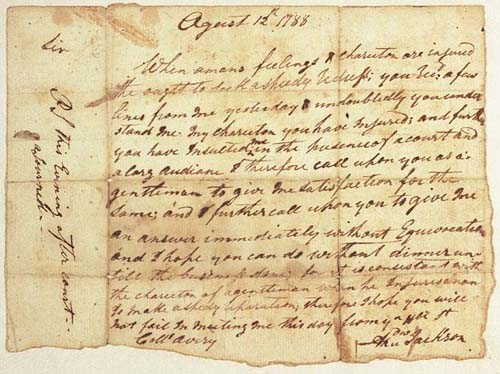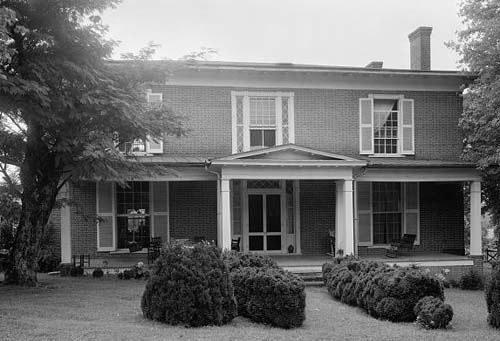10 May 1741–13 Mar. 1821

Waightstill Avery, first attorney general of North Carolina, represented Burke County in the House of Commons for five years and in the senate for one.
The first Avery to settle in this country was Christopher Avery, who, with his young son James, came from England in the ship Arabella and landed at Boston in 1631. James Avery married Johanna Greenslade. The youngest of ten children of this marriage was Samuel (b. 14 Aug. 1664), who married Susanna Palmes, daughter of William Palmes of the Province of Munster, Ireland, on 27 Oct. 1686. Humphrey Avery, sixth child of Samuel and Susanna Palmes Avery, was born 4 July 1699, married Jerusha Morgan, and had twelve children. The tenth son was Waightstill Avery, born in Groton, Conn.
Waightstill Avery and his younger brother, Isaac, were prepared for college by the Reverend Samuel Seabury. Waightstill Avery was graduated from Princeton, then called the College of New Jersey, in 1766; awarded first honors in his class, he delivered the Latin salutatory. He taught at the college for a year and then read law with Lyttleton Dennis, a prominent Maryland lawyer. Moving to North Carolina in 1769, he entered the colony at Edenton, where he had letters of introduction to such prominent people as James Iredell and Joseph Hewes. He was admitted to practice in the colonies on 4 Feb. 1769 and lived in Salisbury a year; he then moved to Charlotte, where he lived and boarded at the house of Hezekiah Alexander. During this period he renewed contacts with Ephraim Brevard, Adlai Osborne, and others from his Princeton years. While in Charlotte in 1772, he was elected a member of the provincial assembly and appointed attorney general for the Crown. In May 1775 he was a member of the committee that passed the famous Mecklenburg Resolves and was among the signers of that document. In August he became a delegate to the provincial congress held at Hillsborough, which placed the state under a military organization. In September he was appointed one of the thirteen members of the provincial council, which had been given great powers by the provincial congress. On 10 May 1776 he resigned his commission as attorney general. He was a member of the congress that met at Halifax on 12 Nov. 1776 and served on the committee that drew up and reported the first North Carolina Constitution. Governor David L. Swain said later that an examination of the records would indicate that more of the constitution of 1776 was in the handwriting of Waightstill Avery than was in that of any other member of the committee.

After the formation of the state government, Waightstill Avery was elected to the first General Assembly, which met at New Bern in 1777; by that body he was named the first attorney general of North Carolina.
He married, on 3 Oct. 1778 at New Bern, Mrs. Leah Probart Francks, daughter of Captain Yelverton Peyton Probart of Snow Hill, Md. Mrs. Francks had a large farm in Jones County, where they settled.
Avery was made one of the governor's council on 26 Oct. 1779, and in 1779 he resigned the office of attorney general to become colonel of the militia of Jones County in place of Nathan Bryan, who resigned. In this capacity he was engaged for more than two years.
In the meantime, he had purchased Swans Pond plantation in Burke County and sent his wife, two young daughters, and his owned, enslaved people there; he joined his family there late in 1781, when it became apparent that independence had been won.
In 1780, while occupying Charlotte, Cornwallis ordered the burning of Avery's office; of his books and papers, only those stored in the house of his friend Hezekiah Alexander were saved. This evidence of displeasure was visited only upon those whom Cornwallis considered leading offenders.
Avery was elected by Burke County to the House of Commons in 1782, 1783, 1784, 1785, and 1793 and to the senate in 1796. In 1801 he was rendered helpless in his lower limbs by paralysis, but he continued to practice his profession from Raleigh to Jonesboro, Tenn., until a few years before his death in 1821.
Avery, an avowed Presbyterian of puritan extraction, accepted a challenge to a duel from Andrew Jackson, then a young lawyer at Jonesboro court, as a result of a courtroom incident. In a criminal case before the court, Avery had been severe in his comments on some of the legal positions taken by young Jackson. Family stories handed down for generations state that it was Avery's custom to refer to Bacon, the noted English jurist, and then to pull his copy of Bacon's reports from his saddlebags to bolster his opinions. Jackson, in playing a prank on him, substituted a side of bacon for Bacon's book and caused Avery much embarrassment. Avery took Jackson to task for such levity in the court, and Jackson, of a certainty, replied with a challenge to a duel. Avery accepted the challenge saying, "This evening after Court is adjourned," and they went on the field. Jackson fired first, with no effect, and Avery fired in the air; then Avery walked up to Jackson and delivered him a lecture. They left the grounds very good friends.
Avery was a gentlemen of the old school and until his death wore knee britches, powdered wigs, and full dress of the times of Washington. He was a man of great dignity and demeanor but was remarkably courteous in his language and manner, even toward young people.
Colonel Avery had three daughters and a son. His daughter Elizabeth married William Lenoir and settled at Lenoir City, Tenn. Louisa married Thomas Lenoir, another son of his old friend General William Lenoir, and settled first at Pigeon River in Haywood County and afterward at Fort Defiance, the old Lenoir homestead. The third daughter married first a Mr. Pore and then a Mr. Summey and lived on Mills River in Henderson County. Avery's son, Isaac Thomas, married Harriet Eloise Erwin.
Avery died at Morganton and was buried in a family graveyard near there.